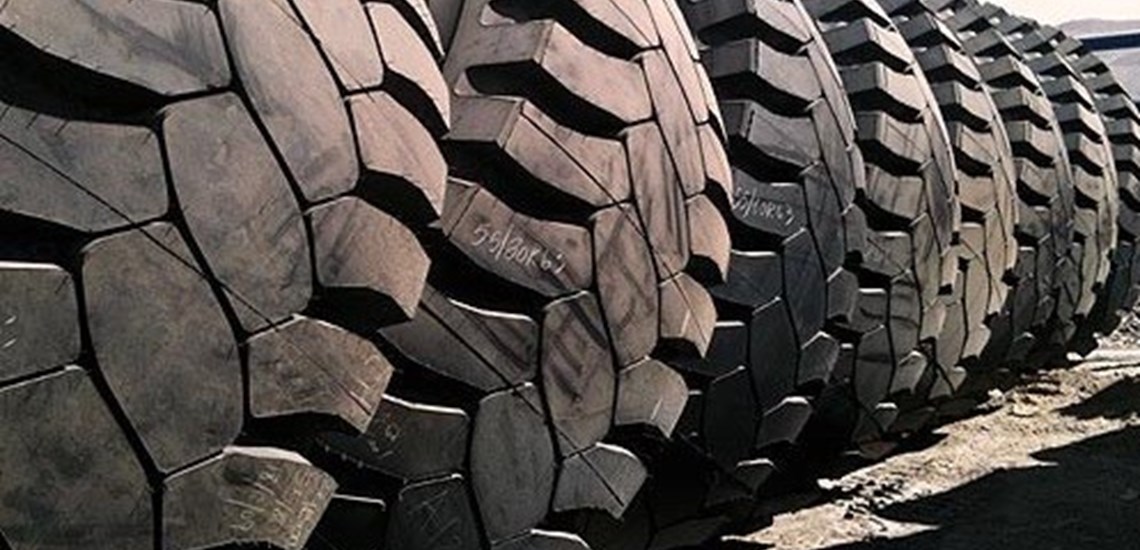According to figures from the Chilean minstery of the environment, the mining tyres sector of Tarapacá and Antofagasta are the largest producers of waste tyres in the country, reaching 70 per cent of the national total that currently accounts for 6.5 million units over 57 inches, that is about 140 thousand tons of waste.
New Chilean Plan for Mining Tyres
At present, only 17 per cent of the total is recycled, a practice that must be reversed once the new Law on Extended Product Liability and Recycling Promotion (REP) is applied, which was approved in 2016. The regulation will come into force with the supreme decrees that will establish collection and valorisation goals for each priority product, where the first draft is for tyres, expected to be published by the end of 2019.
For tyres used in the mining industry, the document states that by 2026, 100 per cent of collection and recovery must be achieved.
Currently in the region there are no plants for recycling tyres, but there are two companies that plan their installation in 2019 and that already work with the mining sector, in the maintenance and extension of the useful life of tyres over 57 inches.
The Secretary of Environment, Roberto Villablanca, indicated that the implementation of the REP Law is a gradual process that will take a couple of years, and that it was a priority to promote the participation of the interested parties during the citizen consultation of the draft of the decree , which was held in October. By the end of 2019 the results will be finalised.
“Today there is no obligation to value this waste, generating the appearance of both legal and non-standard provisions, a problem that will be addressed by this law,” explained Villablanca.
This scenario is recognised by companies in the field of rubber treatment that estimate that there are around 500 thousand tons of mining tyres accumulated in the country.
The REP Law establishes that the manufacturers and importers of the products will be responsible for organising and financing management systems to collect and valorise the waste generated, which will promote the installation of new alternatives, such as the use of tyres in the mixture of asphalt and other by-products such as diesel, coal and steel.
Bailac and Kal Tire are the pioneers that will be installed in 2019 in the region to start this new business model aimed at the mining sector, in which large companies will have to pay recyclers for handling their waste tyres, which will be mandatory by 2026.
The general manager of the Association of Industrialists of Antofagasta (AIA), Fernando Cortez, said that “this is a subject that we will be addressing in a systematic way in our sustainable development councils, together with our partner companies, and we believe that in any case, there is a need for greater coordination between private entities, municipalities and State agencies to achieve this transition, “said Cortez.
The law differentiates tyre recycling goals according to their size, above and under 57 inches, projecting that larger mining tyres should be completely reused in 2026, while those less than 57 inches, should attain a 98 per cent recycling rate by 2028.
And although there is still work to be done in the region, the Environment Secretary said that the concept of circular economy has already been installed in the community, companies and universities, because they have managed to visualise the environmental benefits and the impact positive in the economic and social field of this new model.
Specifically, for small tires, the REP will start in 2021 with the obligation to collect 50 percent and recycle 25 per cent, gradually increasing.
Unlike the business of recycling mining tyres, the treatment of the smallest tyres is still being discussed, with regard to storage, collection and transport logistics, taking into account that the owner of the tyres is the one who must pay for recycling.
In this matter, the general manager of Norte Sustentable, Patricia Bolados, the managing company of the majority of the collection points that receive waste materials in Antofagasta, said that currently, they work with different organisations and institutions supporting the logistics and operation of the recycling waste.
“The new law REP encourages us to expand to also be managers of tyre waste management in the city,” said Bolados, who projects that their customers will be mechanical workshops, public services, and companies, among others, taking charge of logistics of transfer to the recycling plants that will be located on the outskirts of the urban area, “said the manager of Norte Sustentable.
According to the new law, which projects 10 years will be needed to meet the goals of recycling, companies that do not comply with the provisions of the authority, will be exposed to fines of up to 10,000 tax units per year, which would correspond to about $ 6,000 million.
(Source: The Mercury of Antofagasta)


















